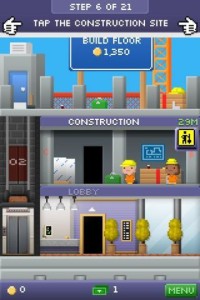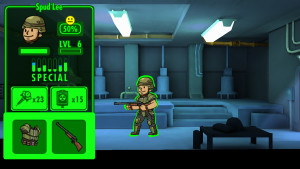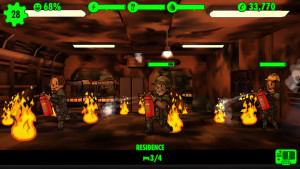 Remember the mobile game Tiny Towers? Players would start on the ground floor of a building and were tasked with expanding upwards by attracting residents, assigning workers to the right job and managing tasks. It was an addictive, free-to-play game with everything that people typically dislike about F2P – microtransactions, premium currency, countdown timers and a never ending goal for players to reach. It was fun and a great time distraction.
Remember the mobile game Tiny Towers? Players would start on the ground floor of a building and were tasked with expanding upwards by attracting residents, assigning workers to the right job and managing tasks. It was an addictive, free-to-play game with everything that people typically dislike about F2P – microtransactions, premium currency, countdown timers and a never ending goal for players to reach. It was fun and a great time distraction.
Then Tiny Death Star came out. It was fantastic. It was the same addictive mechanics and gameplay elements with a Star Wars coat of paint. While this might not have seen the same mainstream success as the original Tiny adventure, it was welcoming to fans of the sci-fi genre and was able to add charm, personality and quirk to the mix off the backbone of an established franchise.
What does all of this have to do with the review you clicked on? It’s one part history lesson and two parts plea to developers. Because everything that was right about Tiny Towers was recreated perfectly, increased by over 9,000!!! and then Bethesda removed all the problematic F2P elements.
Is Fallout Shelter a perfect game, no…but it is a perfect mobile game and textbook example of what fans could want from big-name publishers (*cough* Nintendo/DeNA merger *cough*) joining the mobile space.
What You’ll Enjoy
Fallout takes place in a post-apocalyptic world after nuclear war has made the surface unlivable for humans. Despite it’s heavy-thematic big-brothers, Fallout Shelter remains kid-friendly and light hearted. You are tasked as the Overseer of a vault and must manage the helpless dwellers into building a better life underground.
 For you, the Overseer, there is a sense of wonderment and creation as you first begin to build and manage your Vault. You’re given three different resources to manage (water, electricity and food) in addition to the responsibilities of placing your vault dwellers in the right job, maintain a steady increase in population, explore the wastelands, greet visitors, build new areas, fight off raiders, extinguish fires, defeat radroaches and a plethora of daily tasks to increase your available caps.
For you, the Overseer, there is a sense of wonderment and creation as you first begin to build and manage your Vault. You’re given three different resources to manage (water, electricity and food) in addition to the responsibilities of placing your vault dwellers in the right job, maintain a steady increase in population, explore the wastelands, greet visitors, build new areas, fight off raiders, extinguish fires, defeat radroaches and a plethora of daily tasks to increase your available caps.
It feels possible to fail and like you are learning on the fly in the best possible way. The game holds your hand in these tutorial levels, but there is also a sense of danger and a feeling that the decisions you are making matter to the post-apocalyptic survival of the community. This danger can be frustrating as you rush (instantly gather resources) a room with a 27% failure rate and do actually fail…but without risk there is no reward and Fallout Shelter realizes this.
The Vault Dwellers move around and interact like a community. They engage in banter while working, usually jokes or insight into their personalities, mull around the vault while on break and rush to whichever room they are placed in. Yes, you will encounter some repeat dialogue but there is a vast amount of options for the conversation to venture. These characters are aware of their surroundings and will call out if a dead body is left in the room or if one of their relatives is hanging around.
If you are ever in the need for any random cheesy one-liners (and who isn’t), pay attention to a male and female vault dweller as they begin flirting with each other. It is deceptively clever at times.
One of the more overlooked pieces that I have to imagine took a lot of effort to develop is the running log while a dweller is exploring the wastelands. Every ten to twenty seconds they are adding a new observation from their journey, which can be daunting to even pretend to read after they have been away for a couple hours.
Fallout Shelter oozes Fallout references and charm throughout the game. The SPECIAL status which play a role in the main series return and help guide players on how to assign dwellers. Pipboy himself is the mascot within the vault and will offer tips, hints and a thumbs up whenever a job needed. And the dwellers will make small references to the greater world of Fallout in their conversations.
There is a microtransaction system available, but it is unobtrusive. The only thing players can purchase are lunch boxes, which contain 4 random cards. The cards can offer resources, caps, weapons or outfits which can be earned in game and every box has a rare card which has increased caps or a special dweller, outfit or weapon. I was able to earn one to three lunch boxes in my first week of normal play through daily quests.
What Might Frustrate You
 I don’t see Fallout Shelter having a lot of staying power. After the initial hurdle of resource management I never felt like my vault was in any real danger. I have a steady stream of resources, dwellers and more weapons than I can carry. Without a fail-state available, the only goal was to increase the population to unlock additional rooms. The last structure is available after 100 dwellers and to be honest the last unique room is achieved after 50.
I don’t see Fallout Shelter having a lot of staying power. After the initial hurdle of resource management I never felt like my vault was in any real danger. I have a steady stream of resources, dwellers and more weapons than I can carry. Without a fail-state available, the only goal was to increase the population to unlock additional rooms. The last structure is available after 100 dwellers and to be honest the last unique room is achieved after 50.
Once players have a handle on the resources, gameplay mechanics and events which occur there isn’t the same feel of variety. Raiders always launch in the same attack pattern, there are only two types of incidents and having 100+ dwellers makes everyone seem inconsequential as opposed to the lower head count.
Fallout Shelter can be exciting to explore and discover, but kind of becomes the same repetitive tasks once things are up and running.
Final Verdict
To be honest, all games become less engaging the longer you play (feel free to debate in the comments below) so that isn’t much of a criticism for Fallout Shelter, but it does sneak up on the player quickly. But if that is the worst thing to call out in a F2P game, it is still obviously a huge win.
Bethesda treated Fallout Shelter like a AAA experience by debuting on the E3 stage and compared to the other mobile games available it truly stands above the other offerings. This should be the future of mobile experiences (not necessarily Fallout Shelter clones), where publishers treat their franchises with respect and offer unique experiences which build upon established genres but with the polish and expertise of an established developer.
If you have a phone, check out Fallout Shelter. It’s free, enjoyable (addictive for some) and one of the best mobile games available.
Level Up, Friends!
